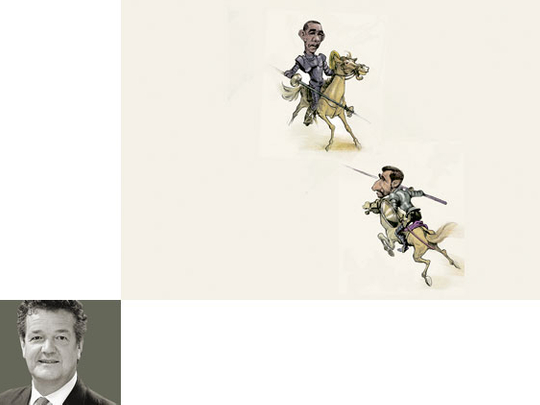
A confrontation is building up between Iran and the US over Iran's nuclear activities. This is very likely to explode in 2012 with all sorts of unpredictable consequences as military activities in both directions seem possible. But because there is no desire in the US to send in ground troops, or to force regime change on the Iranian Islamic Republic, the likely outcome by 2013 is that a slightly damaged Iran will still be there, but ever more fiercely resentful of American activities.
This week's report on Iran from the UN nuclear watchdog, International Atomic Energy Agency (IAEA), was the most serious indictment of Iran's nuclear activities to date. Even if there is not yet a ‘smoking gun' there is at least a case which Iran should answer if it wants to stop the controversy, but President Mahmoud Ahmadinejad actually finds the international confrontation with the US very useful for his own political purposes.
As the IAEA report spells out, the agency has become increasingly concerned about "the possible existence in Iran of undisclosed nuclear-related activities involving military-related organisations, including activities related to the development of a nuclear payload for a missile".
The IAEA believes that Iran has been working on research for a nuclear bomb to arm one of its long-range missiles. Iran denies this absolutely, and Ahmadinejad's government insists that it has no military nuclear programme, and insists that all Iran's nuclear activities are civilian and designed to generate power, as it is entitled to do under the Non-Proliferation Treaty.
But this time the IAEA has included a substantial annexe to its main report which sets out the case against Iran in more detail than ever before. To date, the case against Iran depended on rather sketchy information provided by the US in 2005, but this has been much expanded by the IAEA using 10 UN member states' intelligence sources.
This new information all feeds happily into Washington's media and political establishment where it is a standard assumption that Iran is a very dangerous nation, that it is well beyond any negotiation, and that it has to be dealt with by force. There are no votes to be gained in the US for supporting talks with Iran, so the sad outcome is that within Washington Iran is regarded as a major danger to the world.
For example, even before the IAEA report came out, leading newspapers were spinning in favour of military action, and this kind of war mongering will only be supported by the facts in the IAEA report. David Sanger in the New York Times said that "War may be the only option", as he condemned containment strategies as "completely useless if Iran ever slips a bomb, or even some of its newly minted uranium fuel, to a proxy — Hezbollah, Hamas or some other terrorist group."
Domestic concerns
It is particularly dangerous that Iran has become part of the domestic struggle between the Republicans and Democrats. Obama has chosen to act tough on Iran for two reasons: no American will support any attempt to make peace, and he needs some warlike credentials for the presidential elections in 2012.
This unfortunately mirrors Ahmadinejad's position as he wants his party's candidate to win the Iranian presidential elections in 2012, and given Ahmadinejad's miserable economic record, he needs a dramatic clash with the US to boost his own popularity.
So both the US and Iran are moving towards a clash that both presidents want. This is a dangerous position that others are delighted to help make more complicated and take advantage of the confusion. Top of the list is Benjamin Netanyahu's Israeli regime, which is already floating the idea that the Israeli air force should bomb Iranian nuclear sites. The Americans are against this, but given the heated atmosphere in Washington, no one can really believe that the mainly Bush-era officials on the Iran desks in the State and Defence Departments would be that sorry if an Israeli attack happened.
However, if the Israelis did attack Iran; or worse, if the US attacked using war planes off aircraft carriers, then Iran is almost sure to retaliate. It would probably attack assorted US sites around the world, like the thousands of US troops still sitting in Iraq. But Iran might go one step further and, without too much discussion, attack others who it thinks might have helped in such an attack.
This might well include Saudi Arabia, which recently took great offence at the alleged Iranian attempt to assassinate its ambassador in Washington. It is suspicious that these allegations surfaced at exactly the time they were most likely to cause diplomatic fury. They have to be proved in court, but they have naturally already inflamed opinion in Saudi Arabia.
An Iranian attack on Saudi Arabia would also help fuel the increasing tensions between Sunnis (with Saudi Arabia taking a lead position on this) and Shiite Iran, and any Shiite groups in the Arab world that Iran can find to make common cause, and so increase its political reach in the region.
The problem is that there is no lobby to ratchet the tension back. It seems inevitable that a clash will happen, and we have to hope that sensible voices are ready to step in to stop the clash spreading beyond their immediate purposes and spinning into much wider regional violence.








